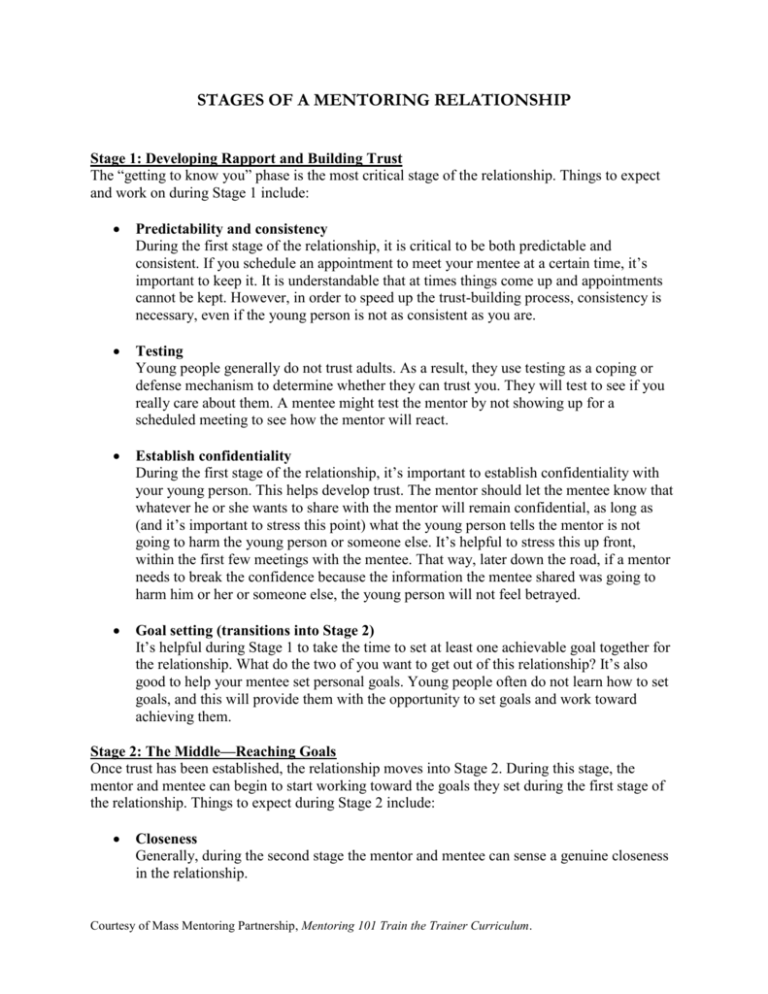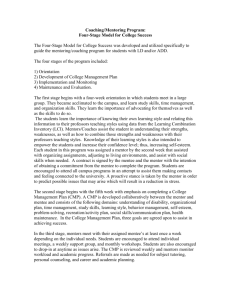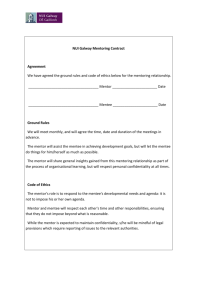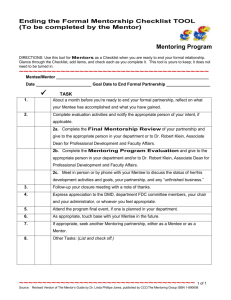stages of the relationship - National Mentoring Partnership
advertisement

STAGES OF A MENTORING RELATIONSHIP Stage 1: Developing Rapport and Building Trust The “getting to know you” phase is the most critical stage of the relationship. Things to expect and work on during Stage 1 include: Predictability and consistency During the first stage of the relationship, it is critical to be both predictable and consistent. If you schedule an appointment to meet your mentee at a certain time, it’s important to keep it. It is understandable that at times things come up and appointments cannot be kept. However, in order to speed up the trust-building process, consistency is necessary, even if the young person is not as consistent as you are. Testing Young people generally do not trust adults. As a result, they use testing as a coping or defense mechanism to determine whether they can trust you. They will test to see if you really care about them. A mentee might test the mentor by not showing up for a scheduled meeting to see how the mentor will react. Establish confidentiality During the first stage of the relationship, it’s important to establish confidentiality with your young person. This helps develop trust. The mentor should let the mentee know that whatever he or she wants to share with the mentor will remain confidential, as long as (and it’s important to stress this point) what the young person tells the mentor is not going to harm the young person or someone else. It’s helpful to stress this up front, within the first few meetings with the mentee. That way, later down the road, if a mentor needs to break the confidence because the information the mentee shared was going to harm him or her or someone else, the young person will not feel betrayed. Goal setting (transitions into Stage 2) It’s helpful during Stage 1 to take the time to set at least one achievable goal together for the relationship. What do the two of you want to get out of this relationship? It’s also good to help your mentee set personal goals. Young people often do not learn how to set goals, and this will provide them with the opportunity to set goals and work toward achieving them. Stage 2: The Middle—Reaching Goals Once trust has been established, the relationship moves into Stage 2. During this stage, the mentor and mentee can begin to start working toward the goals they set during the first stage of the relationship. Things to expect during Stage 2 include: Closeness Generally, during the second stage the mentor and mentee can sense a genuine closeness in the relationship. Courtesy of Mass Mentoring Partnership, Mentoring 101 Train the Trainer Curriculum. Affirming the uniqueness of the relationship Once the relationship has reached this stage, it’s helpful to do something special or different from what the mentor and mentee did during the first stage, which helps affirm the uniqueness of the relationship. For example, go to a museum, sporting event, special restaurant, etc. The relationship may be rocky or smooth All relationships have their ups and downs. Once the relationship has reached the second stage, there will still be some rough periods. Mentors should be prepared and not assume that something is wrong with the relationship if this happens. Rely on staff support Stage 3: Closure If the rough period continues or if a mentor feels that the pair has not reached the second stage, he or she shouldn’t hesitate to seek support from the mentoring program coordinator. Sometimes two people, no matter how they look on paper, just don’t “click.” Some mentor/mentee pairs don’t need to worry about this stage until farther down the road. However, at some point all relationships will come to an end—whether it’s because the program is over, the mentor is moving or for some other reason. When this happens, it’s critical that the closure stage not be overlooked. Many young people today have already had adults come and go in their lives and are very rarely provided the opportunity to say a proper goodbye. Identify natural emotions, such as grief, denial and resentment In order to help mentees express emotions about the relationship ending, mentors should model appropriate behavior. The mentor should first express his or her feelings and emotions about the end of the relationship and then let the mentee do the same. Provide opportunities for saying goodbye in a healthy, respectful and affirming way Mentors shouldn’t wait for the very last meeting with their mentees to say goodbye. The mentor should slowly bring it up as soon as he or she becomes aware that the relationship will be coming to a close. Address appropriate situations for staying in touch Mentors should check with the mentoring program coordinator to find out the policy for staying in touch with their mentees once the program has come to an end. This is especially important if the program is school-based and mentors and mentees meet during the school year but the program officially ends before the summer starts. If mentors and mentees are mutually interested in continuing to meet over the summer, they may be allowed to, but with the understanding that school personnel may not be available should an emergency arise. Each mentoring program may have its own policy for future contact between mentors and mentees. That’s why it’s best for mentors to check with program personnel during this stage. Courtesy of Mass Mentoring Partnership, Mentoring 101 Train the Trainer Curriculum.



